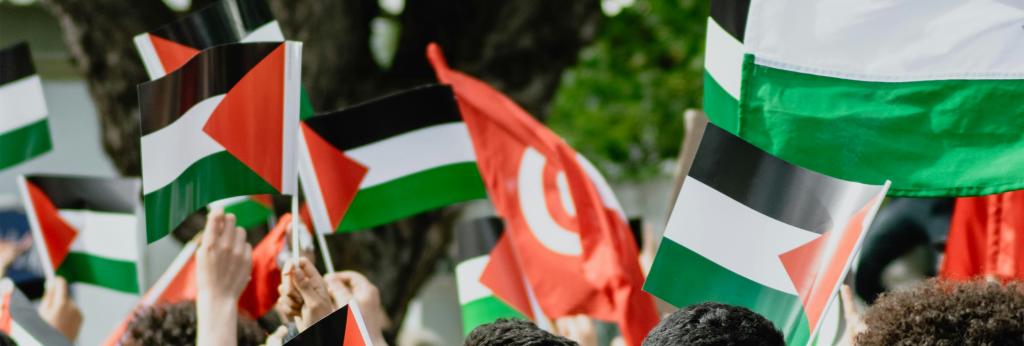In early October 2024, a beekeeper was fined in Italy for having exposed a banner at his market stall which read “Stop bombing Gaza – stop genocide”. The fine was subsequently revoked. Yet, this seemingly trivial incident is a small but emblematic example of the extent to which freedom of expression has come under attack since the beginning of Israel's war in Gaza, and of the granularity of the threats to the exercise of this fundamental right. As also underscored by Irene Khan, UN Special Rapporteur on Freedom of Expression, in the opening paragraph of her latest report to the UN General Assembly, “the conflict in Gaza has unleashed a global crisis of freedom of expression” and “rarely has a conflict challenged freedom of opinion and expression so broadly and so far beyond its borders”.
Over the past year, each of us has been a witness to a genocide. The plausibility that what we see on our screens and read about in the newspapers (which cannot even fully reflect the reality that Palestinians in Gaza and the West Bank face every day) may amount to a real and imminent risk of genocide has also been confirmed by the International Court of Justice. Social media platforms have played a crucial role in providing real-time information about the situation in Gaza. This is especially so given that Israel has severely restricted foreign media access, thereby preventing proper reporting from the ground. Yet, despite the horrifying images and testimonies that Palestinians share with the world every day, the right to freedom of expression of Palestinian activists and their supporters is severely restricted, especially by governments in North America and Europe.
Peaceful protests in support of the Palestinian people have been met with restrictions, blanket bans and even excessive use of force by law enforcement. Academic freedom has been severely constrained, with universities forcibly removing student encampments, taking disciplinary measures against students who participated in the protests, and cancelling and even prohibiting the holding of events on Israel and Palestine. Social media platforms, despite their crucial role for providing access to information on the situation in Gaza, have also significantly contributed to censoring Palestinian content, either because of their inadequate and biased content moderation systems, or following governmental requests for content removal. As reported by Human Rights Watch, between 7 October and 14 November 2023 alone, Israel’s Cyber Unit sent social media platforms 9,500 content takedown requests, 60% of which went to Meta, and platforms overwhelmingly complied with these requests in 94% of cases. Content that was shared in support of the Palestinian cause was frequently removed by social media platforms, including the slogan “From the River to the Sea, Palestine will be Free”, which though meant and interpreted by many as a peaceful call for the right to self-determination of Palestinians has been considered incitement to terrorism or violence by the platforms. The slogan has even been criminalised or sanctioned in some countries.
The role of traditional media has also come under attack. As already mentioned, not only Israel has denied access to Gaza to foreign press, but journalists on the ground have been deliberately killed or arbitrarily detained: according to the Committee to Protect Journalists, as of 29 October 2024, 134 journalists and media workers were confirmed killed (126 Palestinian, two Israeli, and six Lebanese), 41 journalists were reported injured, 2 journalists were reported missing, and 71 journalists were reported arrested. Under the Geneva Conventions, the deliberate killing of journalists is a war crime. Israel has also banned Al-Jazeera and raided its offices. The government also relies on a military censor, which is empowered to fully or partially redact any article dealing with “security issues”: in 2023, 613 articles were barred from publication, and 2,703 articles were redacted.
If journalists reporting from Gaza and the West Bank have been silenced by Israel, a worrying majority of media outlets from North America and Europe have consistently failed to perform their watchdog role and speak truth to power: newspaper headlines and TV shows have regularly dehumanised Palestinians, and their coverage of the situation in Gaza has consistently employed wording that contributes to the creation a “normality” where, as also underscored by Fuad Zarbiyev, Palestinian lives are not as grievable as Israeli ones.
That a beekeeper is fined for exposing a banner calling for the end of a genocide, that students lose their scholarship for calling on their government to demand a ceasefire and on their university to divest from corporations profiting from the conflict and occupation, that a professor is prevented from giving a lecture about Gaza in a university premise, that our governments respond to student peaceful protests with violence — these are issues that should concern each of us. Each of these restrictions, when failing to comply with the standards of legality, legitimacy, necessity and proportionality (as set out in international law), violates our fundamental right to freedom of expression.
The right to freedom of expression is considered to be an enabler to the exercise of other fundamental rights. As reiterated by the UN Special Rapporteur on Freedom of Expression, “the genocide in Gaza, the violation of human rights in the occupied Palestinian Territory and the failure of Israel to respect its international legal obligations, including the occupation of Palestinian territory, are matters of global public interest.” By failing to stand up for the exercise of our right to freedom of expression in support of the Palestinian cause, and by failing to demand accountability from those actors who consistently violate it, we contribute to its erosion. And by failing to stand up for the rights of Palestinians, including their right to have their voices heard, we fail to stand up for human rights.
–––
The views and opinions expressed in this article belong solely to the author and should not be construed as representative of or endorsed by the Geneva Graduate Institute.



